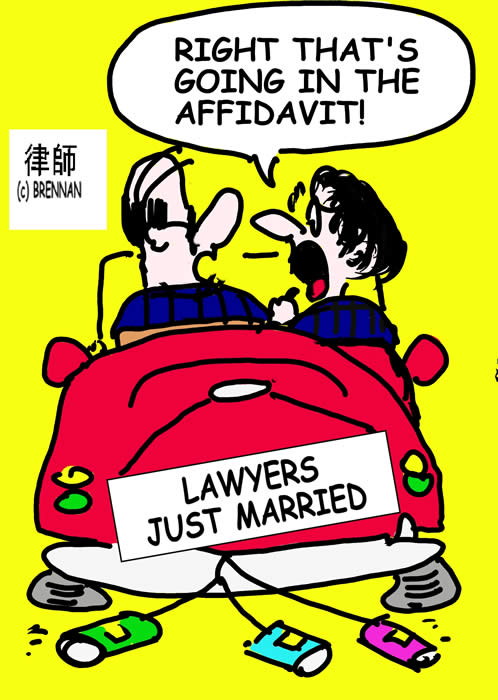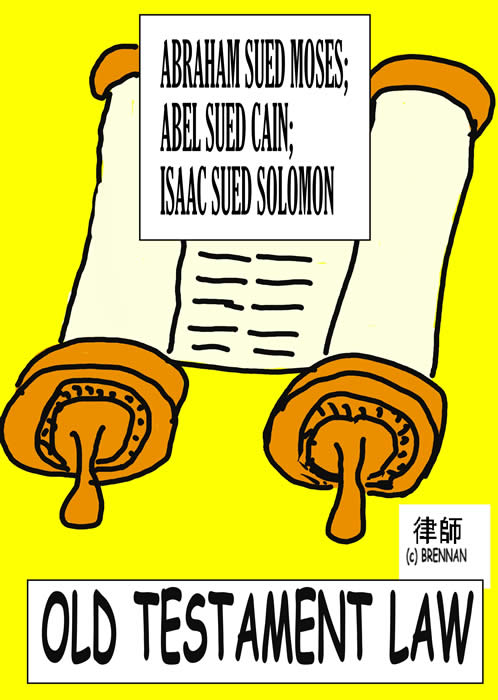
Volume
34 - September 2009

Franchise special.
click here for a printable version
This month - franchising what the small business owner needs to know
Paul Brennan
Editor
paul.brennan@brennanlaw.com.au
The Messiah’s* guide to franchising-
What potential Franchisors need to know
 The great thing about being a member of a franchise, is that providing that it was your spouse’s idea to join and not yours, there are hours of enjoyment complaining about the fees and the lack of support. It is a luxury that we small business owners, not operating under a franchise operation and with only ourselves to blame, can only envy.
The great thing about being a member of a franchise, is that providing that it was your spouse’s idea to join and not yours, there are hours of enjoyment complaining about the fees and the lack of support. It is a luxury that we small business owners, not operating under a franchise operation and with only ourselves to blame, can only envy.
However, we small business owners live in hope that one day we may find people who want to copy our way of doing things. The trade mark carefully crafted from our children’s names. Our views (which our spouse never wanted to listen to) set out in an operating manual (OM), quoted by our franchisees/disciples in reverent terms. Visits to far flung outposts to preach our vision. A sought after speaker to motivate the unwashed masses of our industry to “Do It Our Way”.
Government distrust of Messiahs has been around for sometime*. Messiah’s have arrived from industries as diverse as “hot dog selling" to “dog poo picking up” and government have adopted industry codes to regulate these erstwhile charlatans.
Here are seven tips for budding Messiahs:
- If you are offering an on-going monitored system, for a fee under a trade mark, then that is probably a franchise and the Franchise Code automatically applies. Basically, if you have to ask if what you are doing is a franchise, it probably is.
- It is not legally difficult to set up a franchise under the code. You usually have a written agreement trying to make the franchisee do things your way in order to protect your brand. This is not the Third Reich and if the agreement is too severe, a court may find it void (franchise fees could be ordered to be returned) or order you to compensate your franchisee for any losses they have suffered.
- Prepare a disclosure statement ("DS") in which you try to tell new franchisees what they are getting into e.g. termination, dispute resolution, ongoing costs, cooling off period and any skeletons in your closet such as whether you are being sued.
- There are no specific criminal penalties for being a lousy franchisor. It is an offence to make false and misleading representations but even then you would need to go some to get prosecuted. However, overstating profit expectations may do it, so try to avoid that. The general law applies for outright dishonesty but you probably know that.
- The agreement sets out the agreement between both parties. Usually it provides that “what you say goes” so if you want to change the way the business is done, it is changed. However, if these changes are not reasonable and you adopt a thuggish manner to enforce the changes, this is unconscionable conduct and can lead to civil penalties.
- If the facts stated in your DS change in a material way, you must issue another DS. On renewing the agreement, you must give another DS, if asked by the Franchisee.
- Changes to the operating manual, although allowed in the Agreement, should be a little restrained and not try to rewrite the original deal set out in the agreement.
The law will allow you to be a Dictator in the name of protecting your brand but a benign one who must treat his subjects fairly well and act reasonably and not thuggishly which. frankly, takes a lot of the fun out of it.
* see New Testament.
(c)Paul Brennan 2009.
If you were interested in this topic see Copyright Law for Creative People by clicking here
Who wants to be a franchisor? 10 ways for small business entrepreneurs to avoid the franchise trap
 For savvy business owners, greatness in the form of becoming a franchisor is often thrust upon them.
For savvy business owners, greatness in the form of becoming a franchisor is often thrust upon them.
The documentation is excruciatingly long, government legislation arduous and there is a requirement for you to give notices and prepare information “just so”. Such requirements can deter the entrepreneur and often causes a good idea to be put in the too hard basket.
It may be a matter of having your lawyer look at the definition of franchise and try to hit the bar beneath it so that the arrangement is a licence or distribution agreement of a type not caught by the franchise code.
This will not stop you creating a Third Reich in the future, but for those who can limit their initial ambition to something less than world domination, it is a start.
What is a franchise? Well, it is MacDonalds, Jim's Mowing, Muffin Break etc. It involves a trade mark, a fee to use it and a way to carry on a business dictated by the franchisor.
If the agreement is more than 15 pages long then you may be in franchise territory.
Here are 10 things to do to avoid this franchise trap:
It requires a system over and above saying “here is my trademark and product for x years, give me a fee and get on with it”. For instance avoid:
- Suggesting retail prices;
- Setting out a comprehensive advertising program.
- Grand plans for compensation and bonus structures.
- Centralised record and bookkeeping.
- Appointing regional directors.
- Asking to inspect a business plan.
- A right to inspect their financial records.
- Approval of their advertising.
Basically, try not to be a control freak. Keep it simple. If the idea takes off, there shall be plenty of time to turn it into a full blown franchise with all the expense and paperwork that entails.
You must document the arrangement to protect your brand with a few limitations e.g. do not go overboard in the advertising promises. Training, advice and encouragement are allowed but do not go over the top e.g. weekend away boot camps.
In fact, it means running the licence arrangement like you do your small business, “on a shoe string”. It is possible to have something that will eventually grow into a franchise, but is easy to commence.
(c) Paul Brennan 2009. A lawyer practising on Queensland’s Sunshine Coast and is a post graduate in IP law.
If you found this useful, it all starts with a trade mark. Click here to watch a video clip about the seven things you need to know about trade marks
Oh, oh, you're in trouble.
-What are the consequences of failing to comply with the franchise code?
 As a business owner there are many legal pitfalls in life that never happen, unless of course you are a franchisor.
As a business owner there are many legal pitfalls in life that never happen, unless of course you are a franchisor.
Franchisees tend to blame the franchisor, sometimes quite rightly, if things are going badly. Landlords and banks are on the franchisee’s tail as business expenses continue even if sales are down. When their backs are against the wall suing the franchisor can seem the best option.
Franchisees hope that if a comma is left out of the 2nd paragraph of the DS the franchisor will be taken out and shot.
In practice, the Court has a broad discretion to grant relief appropriate to the circumstances of the case. This means that the judge will try to be fair to both sides which can be very irritating as it requires a lot listening, pouring over detail, adjournments and a whole load of other things that few franchisors and franchisees have time for, especially if their business is going to the wall.
The judge has power to :
- Terminate the franchise agreement and give the franchisee their money back.
- Terminate so that the franchisee is free from any further obligation.
- Vary the terms of an agreement so that the code is not breached.
- Award compensation for loss and damage caused by any contravention of the code.
- Decide you are a whinger, award costs against you and tell you to get lost.
The good news for the franchisor is that courts usually try to enforce contracts or at least make them work. Otherwise, the whole commerce system would fail.
Rather than being touchy feely they may adopt the traditional “you entered into the contract, now deal with it” approach.
The bad news is that disputes are costly and take time, win or lose.
© Paul Brennan 2009
The do’s and don’t of “Franchisee Rage”
 The great thing about being a franchisee is that you can share the misery of being in small business with others.
The great thing about being a franchisee is that you can share the misery of being in small business with others.
You hear that the franchisor is going bust. But what are you going to do about it?
What not to do:
- Panic. Teetering on the brink is not the same as going bust.
- Start an action group and broadcast that the franchisor is going bust. This may be defamation and puts you personally in the frame. Also, it may put people off buying the franchise.
- Get your lawyer to engage in correspondence or sue. You should take your lawyer’s advice and be guided by him or her, as correspondence may be a waste of money and launching a court action premature.
- Knee jerk reactions e.g. stopping all payments immediately. This places you in breach of contract whereas the object may be to prove that the franchisor is in breach of its contract with you.
What to do:
- Read the franchise agreement. I know it goes on a bit but it governs your relationship with the franchisor. Identify the obligations of the franchisor. Although, you are unlikely to find many.
- If there is a serious issue, gather the papers together and get a lawyer's advice. This may prevent you from shooting yourself in the foot. In contract matters it is exceedingly easy to do.
- Make your own investigations, noting down what you find out and the source. Calling the franchisor’s office and asking if it is going bust is likely to be met with the answer “No”. But that statement and the date may be good evidence later on if you are trying to prove that the franchisor traded when it was insolvent.
- Check that the rent has been paid. Often, it is the franchisor and not you who is the lessee of your shop.
- Tell everyone else not to panic as it devalues the franchise.
Three things may happen:
- The franchisor survives and it is business as usual.
- The franchisor goes bust and someone steps in to take over.
- You get notice that an administrator/receiver/liquidator has been appointed. A date is usually appointed for a creditors meeting after which you will find out if the franchisor will continue or fold.
A common rumour among franchisees is that the franchisor is teetering on the brink of going bust. As this is not an uncommon business model the rumour may be sort of true rather than being generated by malicious franchisees, but be careful.
© Paul Brennan 2009
In you liked this article watch a short video clip on copyright by clicking here
Disclaimer:
The content of this site and the Law & Disorder eZine is to give you legal basics and in some instances included unashamedly to try and make you laugh. In law it is sometimes difficult to work out what is serious and what is just for fun. Therefore, if you plan to do anything legal, rely on your own lawyer’s advice or instruct me to look at the particular facts of your case. Not only will I deny responsibility for the legal content but also for some of the jokes.
© Paul Brennan 2009.
Editor
Author of the Law is an Ass...Make Sure it Doesn't Bite Yours!
| In this Issue | |
| What potential franchisors need to know | |
| 10 ways to avoid the franchise trap | |
| The consequences of breach | |
| The do's and don'ts of franchisee rage |
|
| Links | |
| Subscribe | |
| Unsubscribe | |
| Forward to a Colleague |
|
| Contact | |
|
Apek Publications PO Box 27 A division of Brennans solicitors and migration agents Phone: 07 5438 8199 Fax: 07 5438 8836 info@brennanlaw.com.au
|
|
